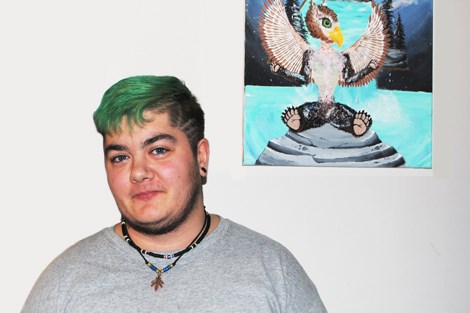On January 1, 2018, Cohen Vachon, 28, publicly announced that he is transgender.
“I came out as transmale,” says Vachon.
Transmale means Vachon was assigned a female gender designation at birth but identifies as male.
This gender mis-assignment at birth, combined with various familial and social pressures, is what eventually led to Vachon developing a condition known as gender dysphoria.
“It is a very uncomfortable feeling when a male brain feels female body parts and it is wrong,” says Vachon.
Vachon, who is hard of hearing, wants to make it clear that being transgender is not the same thing as having gender dysphoria.
“I wouldn't call this [being transgender] a condition as it is a part of who I am,” says Vachon. “Being deaf is a condition. Dysphoria is a condition. Transgender is part of who I am.”
The American Psychiatric Association’s website clarifies that being transgender is not the same as having gender dysphoria. To be diagnosed with gender dysphoria, a person would need to be both transgender and experience “significant distress or problems functioning” in daily life.
Vachon experienced some symptoms of gender dysphoria as a child.
“I knew I was different since around the age of eight years old,” says Vachon. “I began desperately wanting male private parts and started feeling like it's empty down below.”
Vachon, an artist, says drawing nude figures helped him connect with the parts of his body that were missing, but when his step-mom found the drawings, he got in trouble.
“I never drew nudes again and began wearing a ‘mask’,” says Vachon. “I hid and forced myself to stop questioning due to fear.”
The symptoms of gender dysphoria started to appear then.
“Living hidden from your own true self, lying your whole life, and trying to convince yourself to be a certain way because it is wrong and taboo was actually destroying me,” says Vachon. “I felt trapped, stuck, angry, hated, defensive and aggressively blunt towards everyone.”
“Always scared of being mistreated by others because I am hard of hearing, imagine coming out of the closet. I got a lot of anxiety and depression because of all this.”
Vachon says even as an adult he wasn’t ready to come out. He tried to live life as a woman to fit others’ expectations.
“I have my two children,” says Vachon. “My children brought some happiness in my life. Feeling proud to be a mom, I'd doll up for them, felt responsible to present myself feminine and be the woman mom I was ‘supposed’ to be.”
Vachon says it was his youngest child, who was assigned a male gender designation at birth, that gave him the wake up call he needed.
“After a few years, my youngest child came out to me saying she is a girl,” says Vachon. “I had flashbacks, remembering how I felt scared and secretive my whole life. I didn't want that for her.”
Vachon says that seeing the joy that transitioning brought his daughter gave him confidence.
“As she transitioned, I became less and less afraid and started peeling the years of fear and anger off,” says Vachon. “I started dressing more masculine again, learned that non-binary people can now be on health cards, marked as X. I had friends beginning to question me and telling me that I've changed.”
The gender dysphoria, however, was not gone.
“Dysphoria can be triggered by certain events,” says Vachon. “For me, it was a man who called me sir, then when I turned, noticed my chest and said sorry ma'am. Before that, I didn't quite like them or feel entirely comfortable about my breasts, but I didn't hate them. I had come to terms with it. Since that incident triggered the dysphoria, I hate them like a vengeance. I need them gone. I feel gross. They don't belong there.”
Gender dysphoria also affects Vachon’s ability to do what others might take for granted, he says.
“Taking showers only happens at home and that alone is a big task,” says Vachon. “I avoid looking at myself and feel disgusted having to touch my chest. As for down below, realizing I'm missing parts there really makes my heart ache sometimes.”
Not everyone with gender dysphoria opts to medically transition, but Vachon felt it was the right choice for him. In April 2018, Vachon started the process.
“My nurse is new to all this,” says Vachon. “She reached out to another doctor to guide her. Together, they questioned me to see where I was at and see how much I knew about being transgender…Then, they sent me for blood work and other tests. A month later, I got my first Testosterone injection.”
While being misgendered by others has affected his emotional well-being as a person with gender dysphoria, Vachon wants to encourage people like him to be patient.
“When someone is transgender and going through transitions, that person is not the only one transitioning,” says Vachon. “The people around them are as well.”
“The people around me are mentally and emotionally transitioning. They must learn a new name, terms, and what it's all about. They have to get accustomed to everything and realize that I am still the same person they always knew, just that I am physically changing to match how I feel about myself.”
Now, Vachon wants to spread awareness about gender dysphoria and transgender issues.
“Spreading awareness is very important because if I had of known at a young age, I probably wouldn't have been as terrified,” says Vachon. “I am also hoping the awareness will bring more of the health care we need locally.”
There’s still a long way to go for Vachon, so he’s created a Facebook page to help spread awareness called Cohen's Evolving Journey.
Ultimately, Vachon just wants people to respect each other for who they are inside.
“It's not what is in our pants and how we look, tall or short, fat or skinny,” says Vachon. “It's what's in our hearts that matters.”



